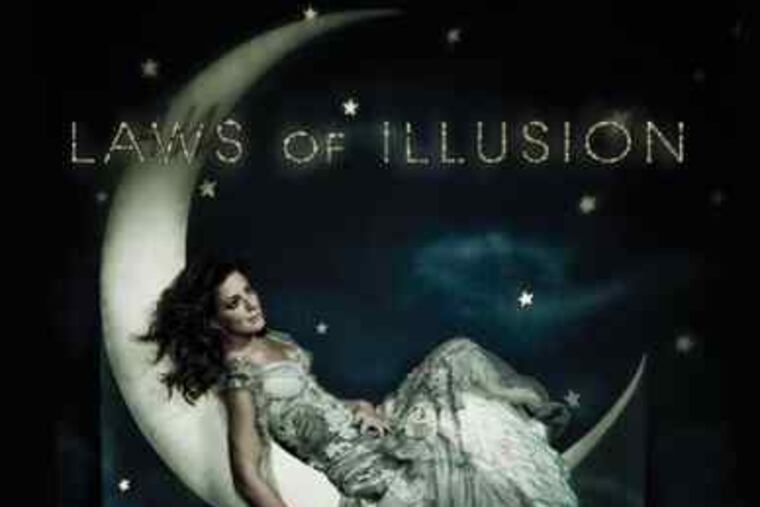Give a listen
Tom Petty's first studio album with the Heartbreakers in eight years is one of three recent releases worth a hearing. The artists are all coming to town this summer.

It's been eight years since Tom Petty made an album with the Heartbreakers, the esteemed band that the straw-haired rocker's been touring with since the 1970s and will back him up when they play the Wachovia Center on July 31 and Aug. 1.
In the interim between their last studio album, The Last DJ, in 2002, and the bluesy Mojo (Reprise ***), which comes out Tuesday, however, the 59-year-old Florida native has hardly been idle.
Petty has seen his stature grow as the most consistently pop-savvy of an elder generation of '60s-schooled American rockers. He's done so while touring extensively with the Heartbreakers, collaborating with director Peter Bogdanovich on the 2007 rockumentary Runnin' Down a Dream, and knocking out a dependably catchy solo album - Highway Companion (2006). In 2008 he also reunited and toured with Mudcrutch, his jammy pre-Heartbreakers '70s band.
In its leisurely pace, Mojo feels very much an outgrowth of Petty's work with Mudcrutch. It also draws heavily from British electric-blues explorers like John Mayall and Peter Green, who turn up regularly on the Sirius/XM satellite radio show Tom Petty's Buried Treasure.
That's good news for fans of the Heartbreakers, which get to stretch out beyond confining pop-song conventions. Two of the three opening cuts, "First Flash of Freedom" and "Running Man's Bible," are more than six minutes long. And while the third, "Jefferson Jericho Blues," is considerably tighter, it's a Howlin' Wolf-inspired roadhouse workout that will almost certainly turn into an extended boogie when the band gets hold of it on stage.
All that extra room means that Mike Campbell, the ace guitarist who's been Petty's right-hand man for decades, has more space to display everything in his always-tasteful, never-boring bag of tricks. Campbell is an unsung guitar hero precisely because he never aims to attract attention to himself, and his lively, well-thought-out solos and fills, like the snarling lines that brush up against Petty's distorted vocals in "Takin' My Time," always make serving the song top priority.
For all the pleasures to be had in the interplay between Petty and his five-man ensemble, though, Mojo is a moderate disappointment. It's uncharacteristically stingy when it comes to delivering the radio-ready pop hooks that have been second nature to Petty for so long.
There's only one outright clunker - the ill-conceived reggae plea "Don't Pull Me Over." But Mojo sounds like it could have been recorded without Petty's ever getting up from the cross-legged position he's pictured in in the CD booklet. Petty's confidence in his ability to get the job done without raising too much of a ruckus is justified, but his re-engagement with his stellar band would have been more effective if they had occasionally gotten their Mojo working in a higher gear.
nolead begins Drake
nolead ends nolead begins Thank Me Later
nolead ends nolead begins (Universal Motown/Young Money ***1/2)
nolead ends There are two ways of looking at actor/rapper/singer Drake's astronomically anticipated debut. One is that it's a rap album with R&B departures. The other is that it's an R&B album that sometimes dabbles in rap. That makes sense given Drake's melting-pot identity - he's Canadian and half-black, half-Jewish - which has long peeved observers who are struggling to categorize him. But it's the blending of styles that creates another identity altogether, and it makes Thank Me Later a triumph.
Backed by tight beats that dissolve into mood-building soundscapes and high-profile guests (The-Dream and Jay-Z among them) who never rise above supporting roles, Drake lets loose with confessions, boasts, come-ons, and some ridiculous one-liners ("Two thumbs up / Ebert & Roeper"). Often, though, he purges tired materialism to find honesty and depth; songs like "Karaoke" and "Shut It Down" feel better suited for the morning after than the night before. Meanwhile, hard-knock moments such as "Light Up" show Drake is just as comfortable on the corner as he is in the club.
So there's a third way of looking at it: Thank Me Later is hip-hop for today, an album that puts a refreshing spin on the genre's possibilities. Drake plays a sold-out Theatre of Living Arts in Philadelphia on Wednesday night.
- Michael Pollock
nolead begins Sarah McLachlan
nolead ends nolead begins Laws of Illusion
nolead ends nolead begins (Arista **1/2)
nolead ends For the last several years, Sarah McLachlan, the Lady of Lilith Fair, has made herself a friend to stray dogs and cats rather than bother to release new compositions. That's cool: hearing her hits as a daily soundtrack to ads for shelter animals was enough for the casual fan. And even if you don't go for McLachlan's painstakingly crafted, sensitive lyrics or breathy, cooing voice, her songs were always compelling.
The doe-eyed McLachlan's first studio album of new material in seven years is no less convincing or radically different from her previous work, though this time she's working through a broken marriage. Her voice remains a bit dreary even when the vibe is jaunty and the lyric is upbeat ("Loving You Is Easy"). She leaps gently into her higher register through the soft electro-pulse of "Awakenings" but barely lingers through the song's subtle hook.
Like the guitar-washed "Forgiveness," "Awakening" is so subdued in emotion and tone, you hardly remember you're listening to a woman singing about heartbreak. You have to stretch to hear the pain in McLachlan's voice in the crushed-velvety "Illusions of Bliss." Then again, at a time when most female pop artists smash you over the head repeatedly with everything they've got, McLachlan's sleepy intensity can be a godsend.
McLachlan's Lilith tour plays the Susquehanna Bank Center on July 28 at 3 p.m.
- A.D. Amorosi